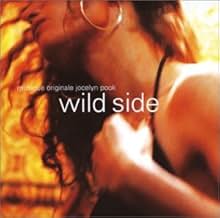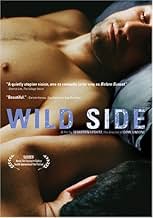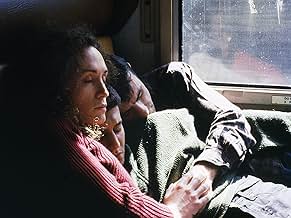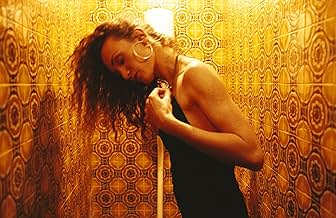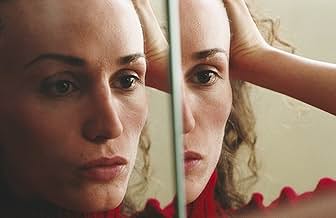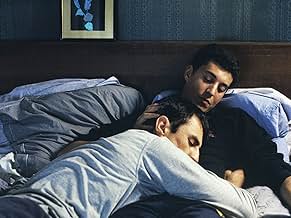IMDb RATING
6.4/10
1.2K
YOUR RATING
A transgender woman who survives prostituting herself in Paris, returns - with her two male lovers in tow - to her family home in the countryside to look after her dying mother.A transgender woman who survives prostituting herself in Paris, returns - with her two male lovers in tow - to her family home in the countryside to look after her dying mother.A transgender woman who survives prostituting herself in Paris, returns - with her two male lovers in tow - to her family home in the countryside to look after her dying mother.
- Director
- Writers
- Stars
- Awards
- 6 wins & 1 nomination total
Anohni
- Le chanteur du café
- (as a different name)
- Director
- Writers
- All cast & crew
- Production, box office & more at IMDbPro
Featured reviews
It was clear with "Come Undone" that Sebastian Lifshitz is a director very much worth watching. "Wild Side", despite its shortcomings, reaffirms his rare talents. His forte is in creating pensive, moody pieces, with a powerful and moving realism. This he does with great precision utilizing light and camera with far greater care than we have become used to. There is a sense of an artist at work. Added to this, he has an astonishing gift for evoking extremely moving and convincing performances from his actors.
The problem with "Wild Side" is that it is devoid of plot and has almost no character development. The mood is what keeps the viewer captivated. While this in itself is not unrewarding, a stronger storyline would certainly have added much. The film terminates suddenly and unexpectedly, usually signifying a lack of inner logic. It could have ended at any point with the same result.
The disparate trio of transsexual, bisexual hustler and Russian immigrant is observed in a totally non judgemental manner and with genuine compassion. This is the films true strength. While flashbacks furnish very sparse information about the transsexual's childhood, almost nothing of the remaining protagonist's backgrounds is revealed. Lifshtz's aim is not to try to understand these social outcasts and their aberrant behaviours but rather to connect us with them on a human level that goes beyond definition of gender are race.
The problem with "Wild Side" is that it is devoid of plot and has almost no character development. The mood is what keeps the viewer captivated. While this in itself is not unrewarding, a stronger storyline would certainly have added much. The film terminates suddenly and unexpectedly, usually signifying a lack of inner logic. It could have ended at any point with the same result.
The disparate trio of transsexual, bisexual hustler and Russian immigrant is observed in a totally non judgemental manner and with genuine compassion. This is the films true strength. While flashbacks furnish very sparse information about the transsexual's childhood, almost nothing of the remaining protagonist's backgrounds is revealed. Lifshtz's aim is not to try to understand these social outcasts and their aberrant behaviours but rather to connect us with them on a human level that goes beyond definition of gender are race.
Confronting and acknowledging other sexualities often stems either from an intimate awareness of other orientations on one hand, or a determined political correctness on the other. Wild side, a film of haunting images and an unusual love triangle, opts for the former.
As the film opens, the camera pans slowly over a naked body of someone asleep. The gaze is quite sensual, but the figure fairly androgynous. The curve of a bosom appears, reassuringly female, and then we see the penis of the sleeping form a few moments later. Cut to a Parisienne bar where an audience of transsexuals listen enraptured to the almost operatic quality of a singer lamenting a dead lover ("I Fell in Love with a Dead Boy"), the song ending with the question, "Was he a boy or a girl?" Wild side proceeds to alternate between scenes of exquisite beauty, such as a figure running through a lush field - to scenes of tawdry sexuality, like a quick blow-job in a red light area. We meet Stephanie, a transsexual who has been reduced to turning tricks as a prostitute. The flashbacks show her as a young boy, Pierre. As the story develops, we see her leaving Paris to care for her terminally ill mother, together with her new Russian boyfriend Mikhail. They are soon joined by her friend Djamel, a bisexual male who has also been working as a prostitute in Paris.
Wild side is beautifully photographed. The French countryside and imaginative camera angles are complemented by excellent and typically unpretentious French acting which draws a clear distinction between the intimacy of lovers and the functionality of the paid sex, even when conducted with as much courtesy as the situation (and clients) allows. But it is the focus on the ordinary, gentle emotions of Stephanie and her two companions, whether to each other or their family, that helps the audience put Stephanie's trans sexuality into perspective and this is one of the not inconsiderable achievements of the film. We see her primarily as a person and, most importantly, as a woman. There is never anywhere the feeling that 'she' is really 'he' - and it is no effort of political correctness, simply a fact. Stephanie is a woman, emotionally to her mother (who has to come to terms with the change), and also in sharp contrast to the two men (Mikhail and Djamel) in her life. She is a woman who used to be a boy and she still has a penis (which she uses sometimes). Perhaps the recognition of Stephanie being 'she' is nowhere more forcefully apparent than in a fairly crude scene where a voyeur, paying Stephanie to perform sex with Mikhail, tells Mikhail to "f*ck *her*" and then to "jack her off" while he's doing so.
Ultimately, we realise the world of tenderness between Stephanie and her mother, and between her and her lovers, is one that a casual view of her persona would have missed. We are easily obsessed by someone's sexuality when it is not the same as our own - and to the extent that it is hard to see beyond it. In the early days of homophobic social interaction, gay people are simply seen by heterosexuals as people who have sex with persons of the same gender - that image is forefront, even though the same heterosexuals would never dream of continually thinking when meeting a new straight acquaintance, "this is a person who has sex with people of the opposite gender"! With Stephanie, the outward film-flam is two-fold - firstly she is transsexual, and that is difficult to see past for anyone who has never got to know a transsexual as a friend, as another human being. Secondly, she works (or has spent time working) as a prostitute - something we would normally see tattooed on someone's forehead immediately that fact was known. Both these things have affected her life, but they are not the most central thing to her character. They are her 'wild side' perhaps, but one which - at least to her mother, for instance, is of little consequence.
As the film opens, the camera pans slowly over a naked body of someone asleep. The gaze is quite sensual, but the figure fairly androgynous. The curve of a bosom appears, reassuringly female, and then we see the penis of the sleeping form a few moments later. Cut to a Parisienne bar where an audience of transsexuals listen enraptured to the almost operatic quality of a singer lamenting a dead lover ("I Fell in Love with a Dead Boy"), the song ending with the question, "Was he a boy or a girl?" Wild side proceeds to alternate between scenes of exquisite beauty, such as a figure running through a lush field - to scenes of tawdry sexuality, like a quick blow-job in a red light area. We meet Stephanie, a transsexual who has been reduced to turning tricks as a prostitute. The flashbacks show her as a young boy, Pierre. As the story develops, we see her leaving Paris to care for her terminally ill mother, together with her new Russian boyfriend Mikhail. They are soon joined by her friend Djamel, a bisexual male who has also been working as a prostitute in Paris.
Wild side is beautifully photographed. The French countryside and imaginative camera angles are complemented by excellent and typically unpretentious French acting which draws a clear distinction between the intimacy of lovers and the functionality of the paid sex, even when conducted with as much courtesy as the situation (and clients) allows. But it is the focus on the ordinary, gentle emotions of Stephanie and her two companions, whether to each other or their family, that helps the audience put Stephanie's trans sexuality into perspective and this is one of the not inconsiderable achievements of the film. We see her primarily as a person and, most importantly, as a woman. There is never anywhere the feeling that 'she' is really 'he' - and it is no effort of political correctness, simply a fact. Stephanie is a woman, emotionally to her mother (who has to come to terms with the change), and also in sharp contrast to the two men (Mikhail and Djamel) in her life. She is a woman who used to be a boy and she still has a penis (which she uses sometimes). Perhaps the recognition of Stephanie being 'she' is nowhere more forcefully apparent than in a fairly crude scene where a voyeur, paying Stephanie to perform sex with Mikhail, tells Mikhail to "f*ck *her*" and then to "jack her off" while he's doing so.
Ultimately, we realise the world of tenderness between Stephanie and her mother, and between her and her lovers, is one that a casual view of her persona would have missed. We are easily obsessed by someone's sexuality when it is not the same as our own - and to the extent that it is hard to see beyond it. In the early days of homophobic social interaction, gay people are simply seen by heterosexuals as people who have sex with persons of the same gender - that image is forefront, even though the same heterosexuals would never dream of continually thinking when meeting a new straight acquaintance, "this is a person who has sex with people of the opposite gender"! With Stephanie, the outward film-flam is two-fold - firstly she is transsexual, and that is difficult to see past for anyone who has never got to know a transsexual as a friend, as another human being. Secondly, she works (or has spent time working) as a prostitute - something we would normally see tattooed on someone's forehead immediately that fact was known. Both these things have affected her life, but they are not the most central thing to her character. They are her 'wild side' perhaps, but one which - at least to her mother, for instance, is of little consequence.
Wild Side is an often moving, sometimes heartbreaking French film about a trio of friends centered around the life of pre-op transwoman Stéphanie. She is a sexworker in Paris (I think these scenes were filmed in the Bois de Boulogne, where a large contingent of mostly foreign-born transwomen sexworkers do their trade). She comes back into the life of her taciturn mother, a woman who lost a husband and a daughter and had previously decided to break contact with Stephanie after she transitioned. Now, as the only available caretaker, Stephanie is responsible for the mom, and brings her back to their rundown hometown in the North of France. Along the way, we meet Mikhail, a bi or possibly gay illegal Russian immigrant who is involved with Stephanie and Djamel, an Algerian male prostitute from the dumpy highrise projects north of Paris. How they all met is never really explained and not so important... the story is really about their various regrets and how they feel about this trio (not really a manage á trois since they aren't into group sex).
The spine of the film is the powerful performance and screen presence of Stephanie Michelini as Stephanie. While not a trained actress (this was her first acting job) she brings a quiet longing to the role and never has a false moment. She's female at the core of her soul, often very pretty framed by her beautiful ringlets of hair, even when the camera lingers on some of her face's hard edges. Matching her is Edouard Nikitine as Mikhail, giving a powerful, sad performance with dark, sometimes dead eyes. The two have a silent bathtub scene which is loving and erotic at the same time. Unfortunately, Djamel, the gay prostitute, doesn't add much to the mix. Yasmine Beimadi (a professional actor) gives him a bravado and almost Jimmy Cagney pugnaciousness. But why he's in this trio and what he brings to it doesn't seem altogether believable. Perhaps it was to bring out a conflict in Mikhail about being gay... as if his relationship with Stephanie is his last attempt to hang on to woman.
In my experience, such men never have relationships with transwomen and, as with all her customers, mostly very straight-identified men are into pre-op transwomen. I felt Sebastien Lifshitz (who is gay) tried to weld two very different stories together than don't altogether fit. As I watched Wild Side, I kept hoping for more about Stephanie and Mikhail and that a totally separate film had been made about Djamel. Another wonderful performance is given by Josiane Stoleru as Stephanie's sick mother. The scenes between mother and daughter are altogether tender and loving, even when laced with the mother's intense guilt and total disregard for Stephanie as a woman although she relishes her daughter's caretaking of her.
The cinematography in Wild Side (by Agnes Godard) is stunning and Lifshitz is wonderful at using low key sound and silence to add focus and give the film a elegiac tone. Special mention has to be made of one of the scenes opening sequences of roomful of transwomen being dolefully serenaded by genderqueer singer Antony Hegarty (who fronts his own band in NYC). The women in the room form a kind of chorus of trans beauty, pain, solidarity and regrets that is stunning. The song Hegarty sings is mourning the lose of a dead boy (in this care, perhaps, the 'boy' each of his audience members has lost as they transitioned?) It's a beautiful scene but, again, very much a gay man's take on what being a transwoman is. He focuses on the 'super femme gay male' aspects which is reinforced by the 'required' penis shot of Stephanies' body just before song scene.
Also, I found this film's quiet beauty also marred by having Stephanie be involved in sex work and the graphic scenes this entails (focusing on the hypocrisy of her straight clients). Unfortunately, even most gay men have a view of this as being what transwomen's lives are all about (even though Stephanie obviously wants to get out of it). As sensitive as Lifshitz is, he often stoops to an objectification of her that, while beautifully packaged and with a social/political undertone, sends much of the same message as many far more exploitive films.
The spine of the film is the powerful performance and screen presence of Stephanie Michelini as Stephanie. While not a trained actress (this was her first acting job) she brings a quiet longing to the role and never has a false moment. She's female at the core of her soul, often very pretty framed by her beautiful ringlets of hair, even when the camera lingers on some of her face's hard edges. Matching her is Edouard Nikitine as Mikhail, giving a powerful, sad performance with dark, sometimes dead eyes. The two have a silent bathtub scene which is loving and erotic at the same time. Unfortunately, Djamel, the gay prostitute, doesn't add much to the mix. Yasmine Beimadi (a professional actor) gives him a bravado and almost Jimmy Cagney pugnaciousness. But why he's in this trio and what he brings to it doesn't seem altogether believable. Perhaps it was to bring out a conflict in Mikhail about being gay... as if his relationship with Stephanie is his last attempt to hang on to woman.
In my experience, such men never have relationships with transwomen and, as with all her customers, mostly very straight-identified men are into pre-op transwomen. I felt Sebastien Lifshitz (who is gay) tried to weld two very different stories together than don't altogether fit. As I watched Wild Side, I kept hoping for more about Stephanie and Mikhail and that a totally separate film had been made about Djamel. Another wonderful performance is given by Josiane Stoleru as Stephanie's sick mother. The scenes between mother and daughter are altogether tender and loving, even when laced with the mother's intense guilt and total disregard for Stephanie as a woman although she relishes her daughter's caretaking of her.
The cinematography in Wild Side (by Agnes Godard) is stunning and Lifshitz is wonderful at using low key sound and silence to add focus and give the film a elegiac tone. Special mention has to be made of one of the scenes opening sequences of roomful of transwomen being dolefully serenaded by genderqueer singer Antony Hegarty (who fronts his own band in NYC). The women in the room form a kind of chorus of trans beauty, pain, solidarity and regrets that is stunning. The song Hegarty sings is mourning the lose of a dead boy (in this care, perhaps, the 'boy' each of his audience members has lost as they transitioned?) It's a beautiful scene but, again, very much a gay man's take on what being a transwoman is. He focuses on the 'super femme gay male' aspects which is reinforced by the 'required' penis shot of Stephanies' body just before song scene.
Also, I found this film's quiet beauty also marred by having Stephanie be involved in sex work and the graphic scenes this entails (focusing on the hypocrisy of her straight clients). Unfortunately, even most gay men have a view of this as being what transwomen's lives are all about (even though Stephanie obviously wants to get out of it). As sensitive as Lifshitz is, he often stoops to an objectification of her that, while beautifully packaged and with a social/political undertone, sends much of the same message as many far more exploitive films.
'Wild Side' is a beautifully made film: with photography that captures a world both bleak and lovely, understated but human performances, an exquisite score, and an almost achingly painful sense of realism. What there isn't is a lot of plot in the conventional sense, as the film is almost entirely observational; and some of that observation is quite explicit (the central characters are a Parisian transvestite and his/her two lovers). But the film emphasises more what this unconventional threesome share with with the rest of us, without flinching on the detail of their life. Director Sebastien Liftshitz is clearly a major talent, and, while this is not exactly a fun movie, it reminded me of the work of Kieslowski in its sensitivity and composition.
10Rod Evan
Unfinished script? Badly lit? Underdeveloped characters? Designed to shock the bourgeoisie? About half the reviewers here seem to have missed the point with this film - but perhaps it's just a film you'll either love or hate. There are of course many people who simply are not comfortable watching anything which in any way portrays or explores homosexuality.
Not that you would class this as a gay film - but it is definitely one of the best queer films I have seen. Dealing with three characters on the margins of society, it has a no holds barred approach to its subject matter, that is neither glamorous nor judgmental. In contrast to most representations of homo/transexuality this was refreshing.
The sexuality/gender of the central character, Stephanie, was apparent from the first frames of the film. The triangular relationship between her and the two men is one built on sincere and simple respect and equality. There is no question in the film of her having to choose between the two. All three are equally compatible with each other and do not have the usual conventional jealousies and arguments.
The three characters' past and present lives are beautifully portrayed in a sort of collage. This demands some work from the audience to put the pieces together. And why not? There is nothing obscure or pretentious here. Just an honest look at what brought these three people together.
Visually the film ranks highly and is up there with Antonioni and Bresson. The concentration on the urban and rural landscapes and the details of the characters' physical actions say more about character development than any dialogue could do.
A milestone in new queer cinema. This film should receive a far wider distribution. But judging from others' comments perhaps the public are just not yet ready to understand the humility, beauty and sacrifice of in these characters' lives. A great film 10/10
Not that you would class this as a gay film - but it is definitely one of the best queer films I have seen. Dealing with three characters on the margins of society, it has a no holds barred approach to its subject matter, that is neither glamorous nor judgmental. In contrast to most representations of homo/transexuality this was refreshing.
The sexuality/gender of the central character, Stephanie, was apparent from the first frames of the film. The triangular relationship between her and the two men is one built on sincere and simple respect and equality. There is no question in the film of her having to choose between the two. All three are equally compatible with each other and do not have the usual conventional jealousies and arguments.
The three characters' past and present lives are beautifully portrayed in a sort of collage. This demands some work from the audience to put the pieces together. And why not? There is nothing obscure or pretentious here. Just an honest look at what brought these three people together.
Visually the film ranks highly and is up there with Antonioni and Bresson. The concentration on the urban and rural landscapes and the details of the characters' physical actions say more about character development than any dialogue could do.
A milestone in new queer cinema. This film should receive a far wider distribution. But judging from others' comments perhaps the public are just not yet ready to understand the humility, beauty and sacrifice of in these characters' lives. A great film 10/10
Did you know
- TriviaStéphanie Michelini's debut.
- SoundtracksI Fell In Love With A Dead Boy
Arranged By [Cordes] Jocelyn Pook
Composed By, Lyrics By Anohni (as Antony)
Vocals by Anohni
(p) 2004 Maïa Films
© 2004 Naïve
- How long is Wild Side?Powered by Alexa
Details
Box office
- Gross US & Canada
- $15,355
- Opening weekend US & Canada
- $4,268
- Jun 12, 2005
- Gross worldwide
- $15,355
Contribute to this page
Suggest an edit or add missing content

